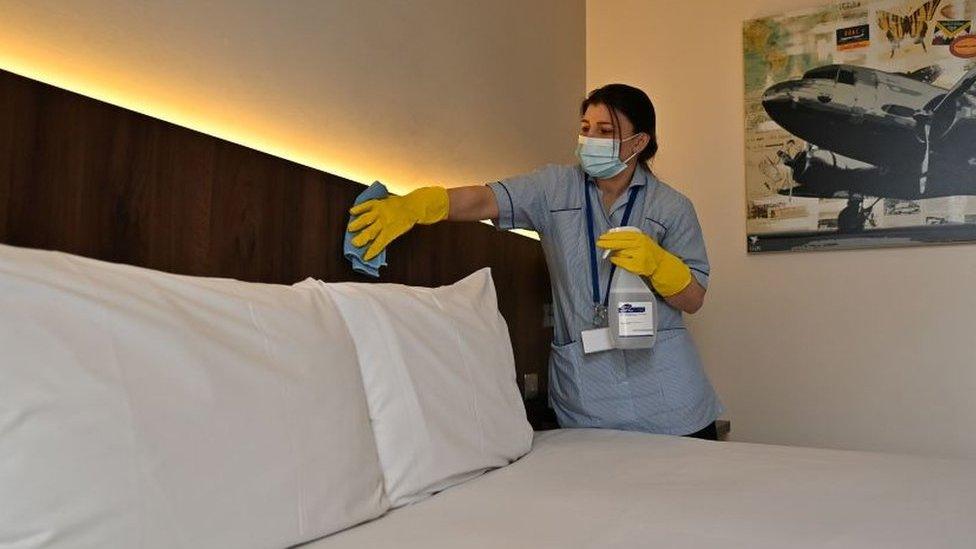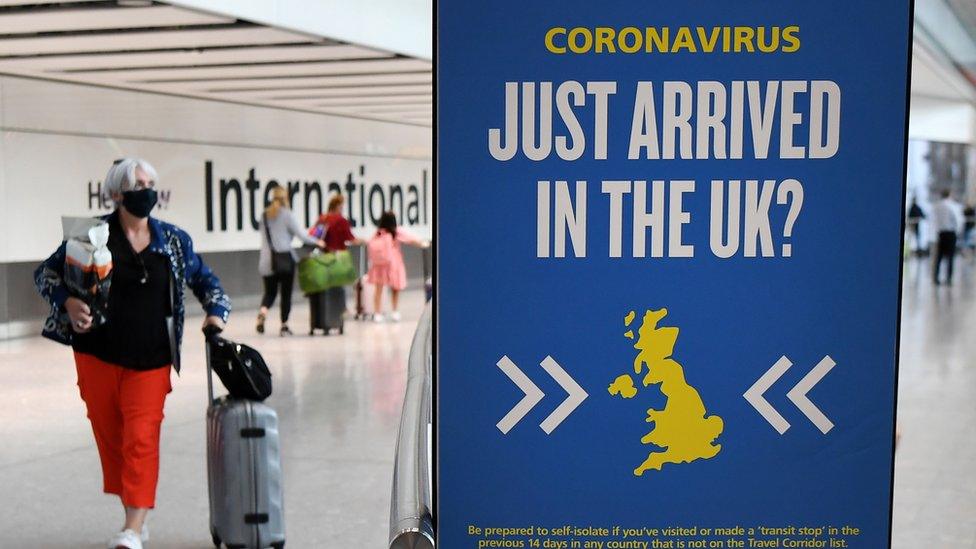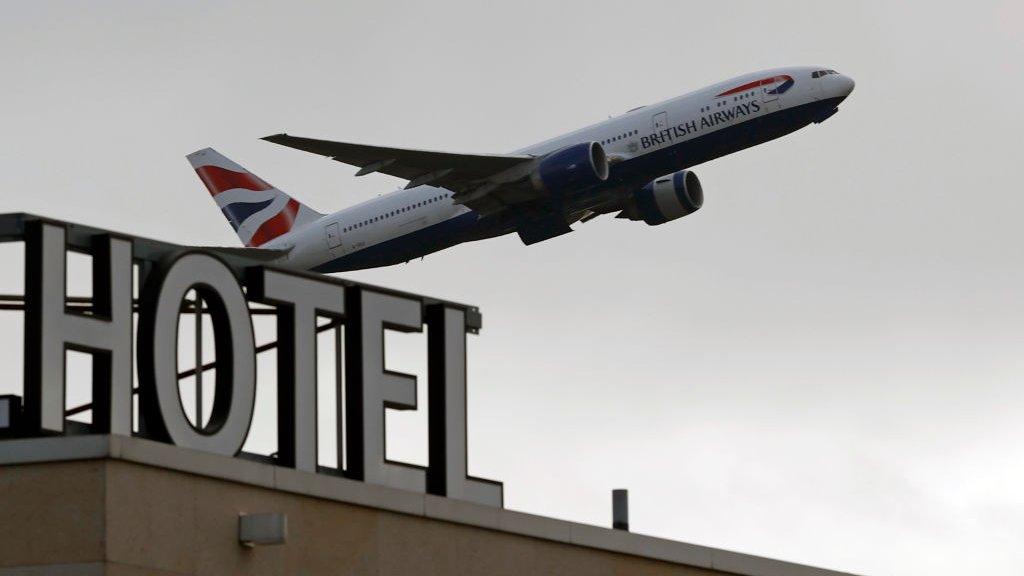Covid hotel quarantine less strict than Australia's
- Published
- comments

England's hotel quarantine system could be less stringent than Australia's scheme, a BBC analysis has found.
A copy of the government's official requirements for hotel operators, ahead of the launch on Monday, showed rules were looser in several key areas.
In England, the rules allow guests time outside with security staff, seen in Australia as putting workers at risk.
The UK government said its hotel quarantine measures were "in line with those in other countries".
Updated guidance for hotels will be released "imminently", the Department of Health and Social Care said.
Meanwhile, Labour's Yvette Cooper, who chairs the Commons Home Affairs Committee, said she understood Border Force still had not been given operational guidance on how the hotel quarantine system would work from Monday.
Home Office minister Victoria Atkins told the BBC those arriving from "red list" countries - deemed high-risk due to new virus variants - would face strict measures even before they departed for the UK.
The requirement to quarantine in a hotel applies to British and Irish citizens, and UK residents, external arriving in England from such countries, including Portugal, Brazil and South Africa, and will cost £1,750 for an individual.
In Scotland, all those arriving internationally by air will have to isolate in hotels.
International travel is currently banned, other than for a small number of permitted reasons, external, including for essential work, medical appointments and education. Holidays are not allowed.
It comes as Home Secretary Priti Patel urged people to "persevere" with England's booking website, where travellers secure rooms and new mandatory tests, after it was hit by technical issues.
The site, external was taken offline minutes after it launched on Thursday but appeared to be working again by 15:00 GMT on Friday following maintenance work.
However, the government's advice page on hotel quarantine, external did not include a link directing passengers where to book and instead asked people to check back later to make a booking.
Ms Cooper said it "isn't good enough" that Border Force staff still do not know how the system will work at airports, including whether they will be asked to check for high-risk arrivals and if those passengers will be taken straight to hotels or will have to queue with other travellers.
"Chaotic long queues with no social distancing in place have the potential to be superspreading events that will undermine the very measures being introduced," the Labour MP said.
'Looser rules'
BBC science editor David Shukman found the rules in England would be looser than Australia's system, which is seen as among the best in the world.
A copy of the guidance for hotels in England's system suggested:
Guests will be allowed access to fresh air outside, escorted by a security guard, whereas in Australia the view is that staff should not be put at risk by escorting people outside
There is no guidance on the timing of meal deliveries, potentially leading to cross-infections between guests as room doors are opened at the same time
Surgical masks will be required for staff, providing less protection than the masks required in Australia's system
The UK government said staff would be able to access regular testing and appropriate personal protective equipment.
In England travellers will only be allowed out of their rooms for a limited set of exemptions, including exercise.
There had been conflicting messages about the policy, with No 10 and the Department of Health forced to issue several clarifications.
Smoking, which at one stage had been described as a legitimate reason for going outside, will not qualify.
Asked about differences between England and Australia's systems, Ms Atkins said standards in England "are amongst the strongest in the world".
Scotland's national clinical director Prof Jason Leitch said hotels there would "allow people to behave like human beings" by going outside for fresh air.
But one Australian epidemiologist described allowing travellers quarantining in hotels to leave their rooms for fresh air as "very risky".
Prof Michael Toole said there was evidence of transmission when guests opened doors, and "with the positive pressure this kind of fog of virus went out into the corridor, travelled down and infected hotel staff".
Prof Nancy Baxter, of the University of Melbourne, said governments had a duty to provide people working in the hotels with "the highest possible protection from infection".
It comes as the Australian state of Victoria enters a five-day "circuit breaker" lockdown in a bid to suppress an outbreak linked to its hotel quarantine system.

LOOK-UP TOOL: How many cases in your area?
LOCKDOWN RULES: What are they and when will they end?
SOCIAL DISTANCING: How can I meet my friend safely?
OXFORD JAB: What is the Oxford-AstraZeneca vaccine?

The UK has secured an initial 4,600 rooms across 16 hotels for its quarantine system.
Transport Secretary Grant Shapps has said that, at present, around 1,300 people per week arrive in the UK from red list countries, with this number expected to fall.
The new system also introduces tougher penalties, with avoiding quarantine in a designated hotel attracting a fine of between £5,000 and £10,000.
Anyone found to have falsified their travel history on the mandatory passenger locator form filled in on arrival risks up to 10 years in prison.
All international arrivals must book and pay in advance for two additional tests during their quarantine period, or face fines up to £2,000.

In a further development, government sources confirmed reports that countries could be added to the red list with just a few hours' notice.
Rather than previous weekly reviews of travel corridor arrangements, there will now be a "fast track" system allowing ministers to quickly curb travel from virus hotspots.
It comes as 15,144 new cases were recorded in the UK, as well as 758 deaths within 28 days of a positive test.
Meanwhile, more than 14 million people have had their first dose of a coronavirus vaccine, according to the latest government figures, external.

39 WAYS TO SAVE THE PLANET: Tom Heap offers up fresh and fascinating ideas to cut carbon
ARE PEOPLE BORN EVIL?: Learn new things with Greg James and Bella Mackie from Britain's most inspiring teachers


Will you be travelling to the UK from a "red list" country? You can share your experience by emailing haveyoursay@bbc.co.uk, external.
Please include a contact number if you are willing to speak to a BBC journalist. You can also get in touch in the following ways:
WhatsApp: +44 7756 165803
Tweet: @BBC_HaveYourSay, external
Please read our terms & conditions and privacy policy
If you are reading this page and can't see the form you will need to visit the mobile version of the BBC website to submit your question or comment or you can email us at HaveYourSay@bbc.co.uk, external. Please include your name, age and location with any submission.
Related topics
- Published12 February 2021

- Published11 February 2021
